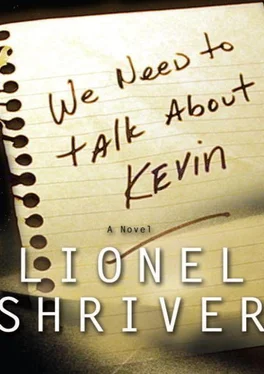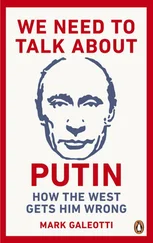I was nervous about approaching him but pushed myself, thinking, there’s no point in moaning about how your adolescent never talks to you if you never talk to him. And I reasoned that the trip to Vietnam the summer before last had backfired for being overkill, three solid weeks of close familial quarters when at thirteen no kid can bear to be seen with his parents, even by communists. Surely one day at a time would be easier to take. Besides, I had forced my own enthusiasm for travel down his throat, instead of making an effort to do what he wanted to do—whatever that was.
My dithering beforehand over how to pop the question made me feel like a bashful schoolgirl gearing up to invite our son to a rock concert. When I finally cornered him—or myself, really—in the kitchen, I went with the sensation, saying, “By the way, I’d like to ask you out on a date.”
Kevin looked mistrustful. “What for.”
“Just to do something together. For fun.”
“Like, do what.”
This was the part that made me nervous. Thinking of something “fun” to do with our son was like trying to think of a really great trip to take with your pet rock. He hated sports and was indifferent to most movies; food was chaff, and nature an annoyance, merely the agent of heat or cold or flies. So I shrugged. “Maybe do a little Christmas shopping. Take you to dinner?” Then I pulled out my ace in the hole, playing perfectly to Kevin’s absurdist strong suit. “And play a round or two of miniature golf .”
He cracked that sour half smile, and I’d secured a companion for Saturday. I worried about what to wear.
In a switch-off reminiscent of The Prince and the Pauper, I would assume the role of Kevin’s caring, engaged parent, while you would become Celia’s protector for the day. “Gosh,” you quipped lightly, “going have to come up with something to do that doesn’t terrify her. Guess that rules out vacuuming.”
To say that I wanted, truly desired, to spend all afternoon and evening with my prickly fourteen-year-old son would be a stretch, but I did powerfully desire to desire it—if that makes any sense. Knowing how time went slack around that boy, I had scheduled our day: miniature golf, shopping on Main Street in Nyack, and then I would treat him to a nice dinner out. The fact he didn’t care about Christmas presents or fine dining seemed no reason to skip the lesson that this is simply what people do. As for our sporting escapade, no one is meant to care about miniature golf, which must be why it felt so apt.
Kevin reported for duty in the foyer with an expression of glum forbearance, like a convict being hauled off to serve his sentence (though in that very circumstance not two years later, his face would instead appear cool and cocky). His ridiculous child-sized Izod knit was the loud orange of prison jumpsuits—not, as I would have much opportunity to establish, a very becoming color on him—and with the tight shirt pulling his shoulders back, he might have been handcuffed. His low-slung khaki slacks from seventh grade were at fashion’s cutting edge: Extending to mid-calf, they presaged the renaissance of pedal pushers.
We climbed into my new metallic double-yellow VW Luna. “You know, in my day,” I chattered, “these VW bugs were everywhere. Rattletrap and usually beaten up, full of destitute longhairs smoking dope and blasting Three Dog Night on tinny eight-tracks. I think they cost something like $2,500. Now this reissue is ten times that; it still fits two adults and a cat, but it’s a luxury automobile. I don’t know what that is—ironic, funny.”
Silence. At last, laboriously: “It means you’ll spend twenty-five grand to kid yourself you’re still nineteen, and still not get any trunk space.”
“Well, I guess I do tire of all this retro-boomer stuff,” I said. “The film remakes of The Brady Bunch and The Flintstones. But the first time I saw it, I fell in love with this design. The Luna doesn’t copy the original, it alludes to the original. And the old Beetle was poky. The Luna is still a little bump on the road, but it’s a surprisingly beautiful car.”
“Yeah,” said Kevin. “You’ve said all that before.”
I colored. It was true. I had.
I pulled into that funky little course in Sparkhill called “9W Golf” and finally noticed that Kevin hadn’t worn a jacket. It was chilly, too, and overcast. “Why didn’t you wear a coat ?” I exploded. “You just can’t get uncomfortable enough, can you?”
“Uncomfortable?” he said. “With my own mother?”
I slammed the door, but with that German engineering it only made a muffled clump .
Heaven knows what I’d been thinking. Miniature golf being fundamentally ludicrous, maybe I’d hoped that it would lend our afternoon a leavening element of whimsy. Or maybe I’d hoped instead for some emotional inversion, whereby because everything that meant something to me meant nothing to Kevin, something that meant nothing to me might mean something to Kevin. In any case, it was wrongheaded. We paid the attendant and marched to the first hole—a bathtub sprouting dead weeds, guarded by a plaster giraffe that looked like a pony with a wrung neck. In fact, all the course’s models were gimcrack and careless, lending the place an ambiance of, as Kevin would say, who-gives-a-rat’s-ass. The traffic on 9W was loud and relentless, and meanwhile, stiff goose bumps rose on Kevin’s arms. He was freezing and I was making him do this anyway, because I had this wonky notion of having a mother-son “outing” and we would, goddamn it, have fun .
Naturally, anybody could roll a golf ball between the claw feet of that bathtub, since the feet were a yard apart. But once the course grew harder—under the missile, over to the lighthouse, down the suspension bridge, around the milk churns, through the doors of the model Sparkhill-Palisades Fire Department—Kevin set aside the studied ineptitude of curling a Frisbee on its side in the backyard, displaying instead the striking hand-eye coordination that his archery instructor had remarked upon more than once. But somehow the very fact that he was so good at this made it all the more pointless, and I couldn’t help but be reminded of our first “game” when he was two, rolling the ball back and forth on the floor exactly three times. For my part, the rank silliness of this exercise had become so glaring that I grew apathetic and muffed the holes. We said nothing, and the course took very little time to complete, if only by the clock; I glanced constantly at my watch. This is what it’s like to be Kevin, I thought. The leaden passage of minute by minute: This is what it’s like to be Kevin all the time.
At the end Kevin posed with his club like a dapper gentleman, still silent but with a now-what? look, as if to say, okay, I did what you wanted and I hope you’re satisfied.
“Well,” I said grimly. “You won.”
I insisted on driving home to get his jacket, though reappearing back at the house so soon embarrassed me—you looked bemused—and going up through Nyack to Gladstone and back to Nyack to shop introduced yet more awkwardness. Nevertheless, now that Kevin had made a hash of my one playful, offbeat idea for our afternoon—having turned it into a mechanical, bone-chilling farce—he seemed more contented. Once we parked (way down Broadway, because the mid-December traffic was bumper-to-bumper and we were lucky to find the space we got), to my astonishment he volunteered a thought.
“I don’t get why you celebrate Christ mas when you aren’t a Christ ian.” He pronounced the Christ with a long I to emphasize the Jesus bit.
“Well,” I said, “it’s true that your father and I don’t believe that some young man who was good at sound bites 2,000 years ago was the son of God. But it’s nice to have holidays, isn’t it? To make part of the year a little different, something to look forward to. I learned studying anthropology at Green Bay is that it’s important to observe cultural rituals.”
Читать дальше












